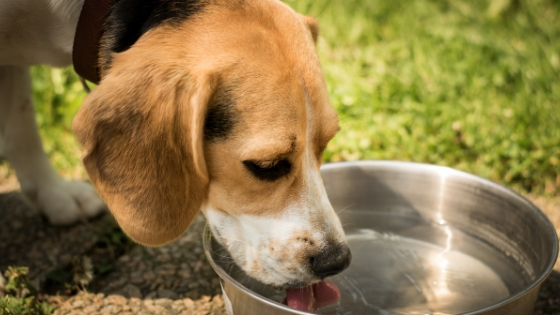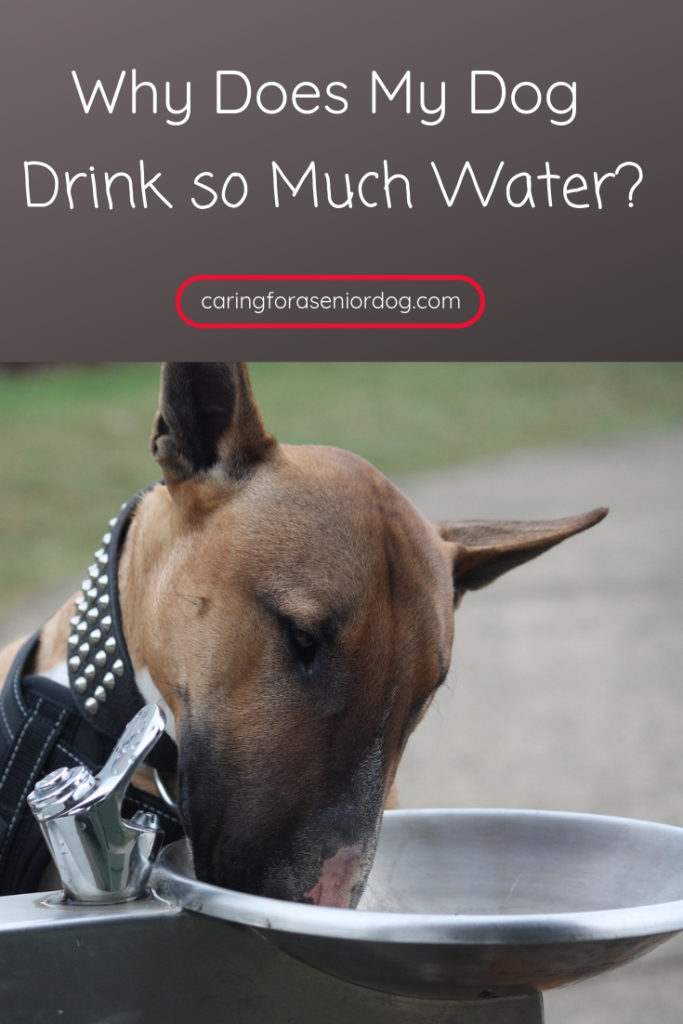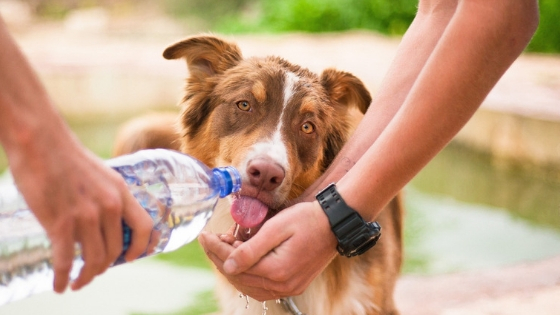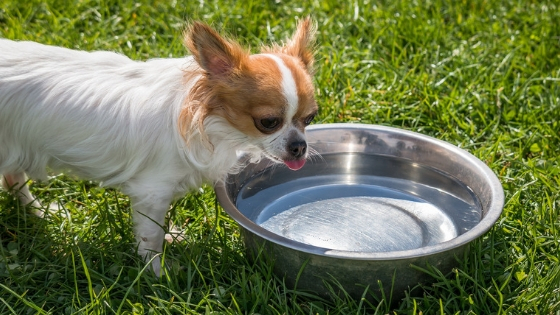
What does it mean when an older dog starts drinking a lot of water?
It doesn’t mean you should freak out that’s for sure, but you absolutely have to take some sort of action.
How Much is Too Much Water?
When we say our dog is drinking a lot of water, do we know for sure he’s drinking more than usual or are we just paying closer attention to what he’s up to lately and it just seems like he is?
What criteria are we using to make that observation?
Is he spending more time over the water bowl?
Does he seem to go back and forth to the bowl a lot?
Does the water bowl seem to be empty quite often?
Do we even know how much the average dog should be drinking in a day?
A good guideline is about 1 ounce per 1 lb of weight.
Therefore. a 10 lb dog would need a bit more than one cup a day.

Maybe Your Dog is Just Thirsty?
I’m not being funny when I say, one reason your dog may be drinking more water is because he’s thirsty.
Does he have access to fresh drinking water at all times? If he doesn’t, then he will likely drink a lot each time he has the opportunity.
What about dry food?
Has he just starting eating it, eating more of it, perhaps a different brand?
Even dry food has some moisture in it but some have more than others.
If you’re feeding a dryer kibble, it could make your dog more thirsty.
He also may have been walking or even running around in very hot weather, or exercising more, and naturally he’s thirsty.
I’m sure he has full water bowls everywhere, and water on his outings, so let’s assume it’s not because he’s thirsty.
So what other reasons could there be?
Why Do Old Dogs Drink a Lot of Water?
If you’ve determined that your old dog is indeed drinking excessively, and it’s not just because he’s thirsty, there may be a medical issue causing the increased water intake.
Some reasons your old dog may be drinking a lot of water:
- Kidney problems
- Diabetes
- Liver disease
- Cushing’s disease
- Addison’s
- Electrolyte imbalance
- Medications (anti-inflammatories, heart failure drugs like Furosemide, anti-seizure medications…)
- Dehydration (which can be caused by diarrhea for example)

The danger of dehydration
I am highlighting this specifically, because it is seems simple but is dangerous to the point of being life threatening.
In a senior dog that danger level can be reached very quickly.
When you first notice your old dog drinking more, the first thing you should do, even before you call your vet is check to see whether or not your dog is dehydrated.
Checking is as simple as very gently grabbing the fur on the back of the neck then releasing.
If the fur goes back into place quickly that’s a good sign, if it stays “tented” up, your dog is dehydrated.
If your dog is dehydrated you must call your vet and get an appointment immediately for that day.
I kept Royal Canin Rehydration Support on hand in case Red ever got a bit dehydrated.
Of course, she went to the vet for fluids, but the rehydration support is always recommended for a couple of days afterwards.
Please do not diagnose your dog on your own, your vet will advise you whether or not your dog needs fluids, and if this product is necessary.
What You Must Do if Your Dog is Drinking a Lot of Water
Whether you’re noticing your dog’s water bowl emptying quicker than usual, or any other changes in behaviour no matter how slight, my best advice is to make an appointment with your vet as soon as possible.
The staff always ask what the appointment is for, so I would not minimize your concerns about how much he’s drinking and emphasize the age of your dog if they don’t know you.
They should fit you in that day or the next at the latest. Again, if he’s dehydrated a next day appointment is not good enough.
Older dogs can deteriorate much quicker than their younger counterparts, so the quicker an issue is dealt with, the better the chances of a good outcome.
Before your appointment
Being at the vet with a beloved pet that is unwell can be stressful as we all know, not to mention the time constraints of the appointment.
So that you don’t forget anything why not make some notes ahead of time to bring with you.
Having things written down means you can get the most out of the time you have with your vet.
Jot down –
- Your general concerns
- What specifically is worrying you
- When you first noticed your dog drinking more
- Are there times of day when he seems to drink more? Before meals? After?
- Does he wake up in the middle of the night to drink?
- Is he peeing more? Having accidents or letting you know he has to go out?
- Have you noticed any other behaviour changes?
- Has anything changed in his schedule? Environment?…

Bring a urine sample if possible
Another thing I recommend is bringing a urine sample to your veterinarian.
In my experience they’ll definitely want one, and if your dog pees right before he walks into the office you’ll likely have to return another time with one.
You might as well bring it, save time, and get answers quicker.
Make sure the sample is not more than 2 hours old, is caught mid-stream and not refrigerated while waiting to leave for your appointment.
Amazingly I’ve never needed to collect a sample from a male dog, but for females I take a plastic bowl or shallow container, and just after they start to pee slide it underneath them.
If I’m using a bowl I transfer it to a new container, or if I have a container handy just put the lid on and seal it with tape so it doesn’t spill.
What to expect while at the vet
I am sure your vet will be impressed with the notes you’ve brought (and the urine sample), as they rely on us for as much information as we can give them.
He will listen do your dog’s heart, lungs, feel around for anything that shouldn’t be there, test the urine and may want to draw blood based on what you’ve told him.
Depending on the type of tests he’s planning on running you may be able to get definitive results on the spot, or samples may need to be sent to a lab for further analysis, which may take a day or two (or more).
Treatment
Any in house tests your vet performs may give enough information for a very educated “guess” and at least the start of a treatment plan.
Only once all results are in and a diagnosis has been made, is it possible to know your treatment options.
My vet always did a urine dip stick test which usually gave enough information to get us started, and if a sample had to be sent off, we would adjust the treatment plan if necessary.
Should You Keep Allowing Your Dog Unlimited Access to Water?
I have always been told to allow my dog to drink as much as she needs, but while you’re on the phone with your vet’s office making your appointment ask what they recommend you do.
What if My Dog Is Drinking Lots of Water and Not Eating?
Noticing that your older dog is drinking a lot of water is concerning, but what if they are also not eating?
Any time your dog loses their appetite, you should pay attention.
Something is wrong or upsetting them. But that doesn’t necessarily mean that it’s a sign of serious illness.
There are many reasons why your dog may have stopped eating.
The first step to helping your dog regain their appetite is identifying the cause.
This may require some careful detective work or some help from your vet.
If your dog has skipped a meal, don’t panic (unless your dog has diabetes – then you may want to try something to entice your dog to eat).
It is not uncommon for a senior dog to eat a little less occasionally as they age.
Is your dog showing any other signs of being sick? Loss of appetite combined with vomiting, diarrhea, or sudden loss of appetite is an emergency, and you should contact your veterinarian as soon as possible.
Otherwise, it is okay to wait a bit and see if your dog’s appetite will return.
Your dog’s reluctance to eat could be caused by stress or anxiety.
It may also be a response to changes in their mealtime routine, like a new food or the placement of their food bowl.
Call your vet if you don’t see any changes after 24 hours.
Some potential causes your old dog is drinking a lot of water and not eating include:
- Nausea or gastrointestinal upset
- Dental problems
- Diabetes
- Liver or kidney disease
- Cancer
Refer to the questions I listed above when preparing for your dog’s vet appointment. Any information you can provide will help them better understand the situation and diagnose the problem faster.
Your vet may recommend a change of diet, depending on the diagnosis.
This may include a canned food that is easier for your older dog to eat or a prescription food that will help to address concerns about liver and kidney function.
Even if your vet determines it is just a sick stomach, it will give you peace of mind.
Conclusion
Whether it’s changes in water consumption, how often your dog pees or just seems a bit off, please make an appointment to see your vet as soon as possible.
It’s better to hear “your dog is fine” then wait too long to have him checked and hear “there’s nothing we can do.”
If you check with your vet and are told it’s nothing serious, or how to address the issue at home on your own, you may not have to bring your dog back the next time he’s exhibiting the same symptoms.

 Can Climate Affect Senior Dog Health
Can Climate Affect Senior Dog Health
Thanks for posting this article. I have a friend who just expressed concern over her dog’s changed behavior. I’m going to forward this to her. It interesting about the dehydration trick with pulling of the skin/fur. That same trick can be used on cats too. I know from my own experience when my cat was sick and dehydrated. The vet gave the same advice. Thanks for these tips. Will share.
Thanks Kamira, I certainly hope the article helps your friend. Actually I first learned that dehydration trick with my cats. One in particular had a very bad thyroid problem that was challenging to treat, and then she developed kidney problems so I was constantly checking her – poor baby!!
As my dogs are all middle aged now and my cat is a senior, I am trying to be much more attentive about how much water they drink. They have a community water bowl, so it is a little hard to monitor how much each of them are drinking.
Hi Beth, it’s definitely challenging monitoring water intake when you have a few pets. I’m home most of the time so it’s easy for me to see who’s drinking and who isn’t. When I was working I had less time to notice, but the water bowls were in areas where we spent the most time so that helped with my investigative work!!
My 14 year old little woman Trixie (pomchi) just started drinking excessively at night. Googling in the middle of the night and came across this post. It’s put my mind a little more at ease and I plan to make her a vet appt asap. Bookmarking your site! Thank you so much!
Glad you found my article helpful